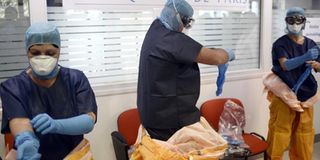European Union, Ebola aid, West Africa, Herman Van Rompuy, World Health Organisation, Marie-Paule Kieny, AFP,

Medical staff put on protective clothing during an exercise to prepare themselves in case of an Ebola virus outbreak at the SAMU headquarters in Paris on October 24, 2014. PHOTO | STEPHANE DE SAKUTIN |
What you need to know:
- WHO promises mass vaccines for continent by mid-2015
- Leaders agreed on Thursday to name Christos Stylianides, incoming Cyprus Commissioner for humanitarian aid, as coordinator for the Ebola response.
BRUSSELS, Friday
European Union leaders agreed on Friday to boost aid to combat the deadly Ebola virus in west Africa to one billion euros ($1.26 billion), EU president Herman Van Rompuy said.
“EU will increase financial help to 1.0 billion euros to fight Ebola in West Africa,” Van Rompuy tweeted on the second day of an EU leaders’ summit in Brussels.
This comes as two US nurses, Nina Pham and Amber Vinson, were declared cured of the disease. Pham smiled and appeared healthy, wearing a turquoise shirt and dark business suit at a news conference outside the National Institutes of Health Clinical Centre in Bethesda, Maryland.
She is scheduled to meet President Barack Obama at the White House before returning to Texas.
WORST AFFECTED COUNTRIES
Vinson has, however, not yet been released from Emory University Hospital in Atlanta, Georgia.
The 28-member EU states and the European Commission have already pledged nearly 600 million euros to pay for medical staff and facilities in the worst affected countries — Liberia, Sierra Leone and Guinea, where some 4,900 people have died of the disease.
British Prime Minister David Cameron has led calls to raise 1.0 billion euros, urging his EU peers to match London’s efforts to tame a disease for which there is no vaccine nor cure, only therapeutic treatment.
So far, there have been some 10,000 cases but experts have warned that infections could soar to 10,000 per week by early December — a terrifying prospect for a disease with a death rate running at 70 per cent.
There have been some isolated cases in the United States and Europe but authorities are trying to put as many resources as possible into west Africa in the hope of containing it at its main source.
On Thursday, officials said a doctor who recently returned to New York from treating Ebola patients in Guinea tested positive, the first confirmed case in the country’s largest city.
The Ebola crisis is a major concern at the EU summit, with German Chancellor Angela Merkel calling for the bloc to agree on how many personnel it should send to west Africa to fight Ebola on the ground.
Leaders agreed on Thursday to name Christos Stylianides, incoming Cyprus Commissioner for humanitarian aid, as coordinator for the Ebola response.
At the same time, Ebola vaccine trials could start in west Africa in December, with hundreds of thousands of doses potentially being rolled out by mid-2015, the World Health Organisation said on Friday.
“All is being put in place to start efficacy tests in the affected countries as early as December,” said WHO assistant director general Marie-Paule Kieny, adding that several hundred thousand doses could be available in the “first half” of next year.
Kieny spoke after the UN health agency held closed-door talks on Thursday on potential vaccines with medical experts, officials from Ebola-affected nations, pharmaceutical firms and funding agencies.
Two experimental vaccines are seen as the leading candidates to beat Ebola.
Supplies of Canadian-discovered experimental vaccine rVSV are arriving in Geneva for a new round of trials.
Hopes are also centred on ChAd3, made by British company GlaxoSmithKline.
There are five other potential vaccines in the pipeline, Kieny said.
Whichever proves its mettle in trials, WHO hopes to deploy huge numbers of doses to Africa for “real-world” tests.
“A vaccine is not the magic bullet, but when ready, it may be a good part of the effort to turn the tide of the epidemic,” Kieny said.
Elsewhere, health authorities in Mali are monitoring at least 43 people who had contact with a baby declared the country’s first Ebola case, WHO said Friday. “As soon as the case was confirmed, local authorities began tracing everyone who had contact with the little girl and her grandmother,” WHO spokeswoman Fadela Chaib told reporters.




